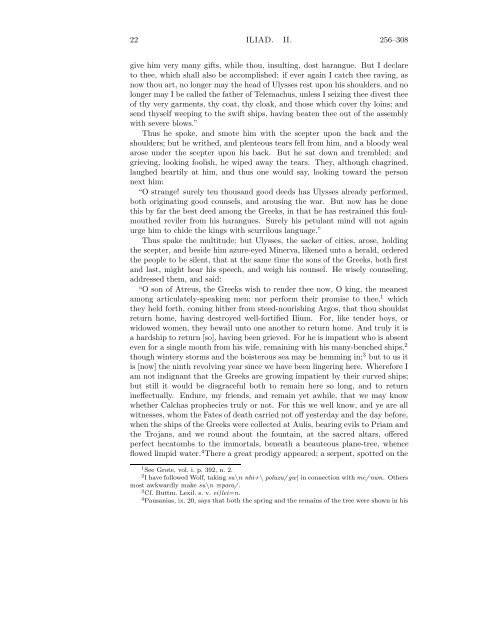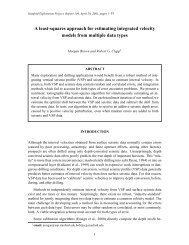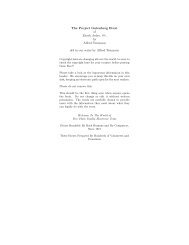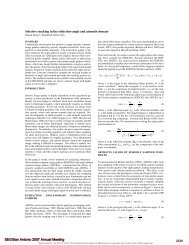The Project Gutenberg Etext of the Iliad of - Stanford Exploration ...
The Project Gutenberg Etext of the Iliad of - Stanford Exploration ...
The Project Gutenberg Etext of the Iliad of - Stanford Exploration ...
You also want an ePaper? Increase the reach of your titles
YUMPU automatically turns print PDFs into web optimized ePapers that Google loves.
22 ILIAD. II. 256–308<br />
give him very many gifts, while thou, insulting, dost harangue. But I declare<br />
to <strong>the</strong>e, which shall also be accomplished: if ever again I catch <strong>the</strong>e raving, as<br />
now thou art, no longer may <strong>the</strong> head <strong>of</strong> Ulysses rest upon his shoulders, and no<br />
longer may I be called <strong>the</strong> fa<strong>the</strong>r <strong>of</strong> Telemachus, unless I seizing <strong>the</strong>e divest <strong>the</strong>e<br />
<strong>of</strong> thy very garments, thy coat, thy cloak, and those which cover thy loins; and<br />
send thyself weeping to <strong>the</strong> swift ships, having beaten <strong>the</strong>e out <strong>of</strong> <strong>the</strong> assembly<br />
with severe blows.”<br />
Thus he spoke, and smote him with <strong>the</strong> scepter upon <strong>the</strong> back and <strong>the</strong><br />
shoulders; but he wri<strong>the</strong>d, and plenteous tears fell from him, and a bloody weal<br />
arose under <strong>the</strong> scepter upon his back. But he sat down and trembled; and<br />
grieving, looking foolish, he wiped away <strong>the</strong> tears. <strong>The</strong>y, although chagrined,<br />
laughed heartily at him, and thus one would say, looking toward <strong>the</strong> person<br />
next him:<br />
“O strange! surely ten thousand good deeds has Ulysses already performed,<br />
both originating good counsels, and arousing <strong>the</strong> war. But now has he done<br />
this by far <strong>the</strong> best deed among <strong>the</strong> Greeks, in that he has restrained this foulmou<strong>the</strong>d<br />
reviler from his harangues. Surely his petulant mind will not again<br />
urge him to chide <strong>the</strong> kings with scurrilous language.”<br />
Thus spake <strong>the</strong> multitude; but Ulysses, <strong>the</strong> sacker <strong>of</strong> cities, arose, holding<br />
<strong>the</strong> scepter, and beside him azure-eyed Minerva, likened unto a herald, ordered<br />
<strong>the</strong> people to be silent, that at <strong>the</strong> same time <strong>the</strong> sons <strong>of</strong> <strong>the</strong> Greeks, both first<br />
and last, might hear his speech, and weigh his counsel. He wisely counseling,<br />
addressed <strong>the</strong>m, and said:<br />
“O son <strong>of</strong> Atreus, <strong>the</strong> Greeks wish to render <strong>the</strong>e now, O king, <strong>the</strong> meanest<br />
among articulately-speaking men; nor perform <strong>the</strong>ir promise to <strong>the</strong>e, 1 which<br />
<strong>the</strong>y held forth, coming hi<strong>the</strong>r from steed-nourishing Argos, that thou shouldst<br />
return home, having destroyed well-fortified Ilium. For, like tender boys, or<br />
widowed women, <strong>the</strong>y bewail unto one ano<strong>the</strong>r to return home. And truly it is<br />
a hardship to return [so], having been grieved. For he is impatient who is absent<br />
even for a single month from his wife, remaining with his many-benched ships, 2<br />
though wintery storms and <strong>the</strong> boisterous sea may be hemming in; 3 but to us it<br />
is [now] <strong>the</strong> ninth revolving year since we have been lingering here. Wherefore I<br />
am not indignant that <strong>the</strong> Greeks are growing impatient by <strong>the</strong>ir curved ships;<br />
but still it would be disgraceful both to remain here so long, and to return<br />
ineffectually. Endure, my friends, and remain yet awhile, that we may know<br />
whe<strong>the</strong>r Calchas prophecies truly or not. For this we well know, and ye are all<br />
witnesses, whom <strong>the</strong> Fates <strong>of</strong> death carried not <strong>of</strong>f yesterday and <strong>the</strong> day before,<br />
when <strong>the</strong> ships <strong>of</strong> <strong>the</strong> Greeks were collected at Aulis, bearing evils to Priam and<br />
<strong>the</strong> Trojans, and we round about <strong>the</strong> fountain, at <strong>the</strong> sacred altars, <strong>of</strong>fered<br />
perfect hecatombs to <strong>the</strong> immortals, beneath a beauteous plane-tree, whence<br />
flowed limpid water. 4 <strong>The</strong>re a great prodigy appeared; a serpent, spotted on <strong>the</strong><br />
1 See Grote, vol. i. p. 392, n. 2.<br />
2 I have followed Wolf, taking su\n nhi+\poluzu/ gw | in connection with me/ nwn. O<strong>the</strong>rs<br />
most awkwardly make su\n ≡para/ .<br />
3 Cf. Buttm. Lexil. s. v. ei)lei=n.<br />
4 Pausanias, ix. 20, says that both <strong>the</strong> spring and <strong>the</strong> remains <strong>of</strong> <strong>the</strong> tree were shown in his







